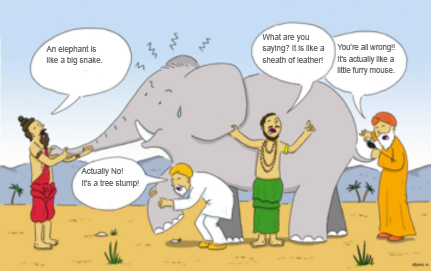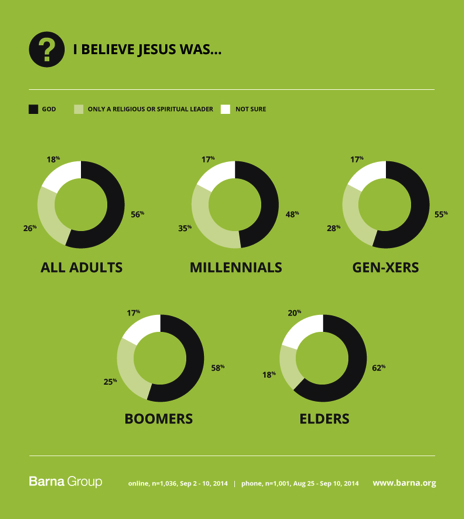Many Paths, Same Destination?
OCTOBER 28, 2017 | Pastor Zachary Pudlo

Perhaps you’ve heard someone say it before…”There are many paths to God.” This is a Pluralist ideal. One of the cries of secular America is the cry to be inclusive to people of all faiths and beliefs. And anyone who claims there is only one path to God, that there is only one true faith, such a person is arrogant and close-minded. Behind these Pluralist ideas there is both good intentions, and at the same time, exclusive rationality. What follows is an examination of both.
Good Intentions
Behind this “many paths, same destination” idea there are good intentions. The intention is to give equality to all people. Every person should have equal value and equal opportunity to get to the destination of heaven. That motivation for equality for everyone is admirable.
As a Christian it would be hard for me to not admit that Christians haven’t always done the best job of being inclusive. Religions in general haven’t been the solution to peace on earth. And while I sometimes shudder to think about ways that I myself have given Christianity a bad name and have failed to show inclusive love to some people, I also don’t want to turn a blind eye towards the immense good that Christianity has caused in the world (more on that later).
So what do we take away from the fact that there has been so much good and so much bad done in the name of Christianity? Before we answer this question, let’s take a look at the exclusivity behind the good intentions of the “many paths, same destination” claim.
Exclusive Rationality
A few of the underlying thoughts behind this “many paths, same destination” claim are actually quite exclusive when investigated. One of the underlying thoughts is that fundamentally all religions teach the same thing. That couldn’t be any further from the truth. Just take the two largest religions in the world as an example. In Islam, Allah only reserves love for those who “do good” (Sura 2:195, 3:134, 148, 5:93). Therefore, if you don’t fight for Allah, you will not be loved by him. In fact, there are groups of people that the Koran says Allah does not love.
In Christianity, God is love (1 John 4:16). Jesus shows love to everyone, including those who don’t “do good”…the prostitute in John 8, the thief on the cross in Luke 23, the crooked tax collector named Zacchaeus in Luke 19.
What’s the point? Christianity is fundamentally different from Islam and every other major religion. How so? In every major religion, the love of God has to be earned through moral conformity. In Christianity, the order is reversed. God loves us even before we conform. Even more, God loves us and died for us before we even showed an ounce of love to him.
That’s only one difference between Christianity and other religions. We could go on to evaluate the differences in many other areas as well including, where we go after death, how we get there, how to show love to others and many more. And if we were to evaluate each of those as well, we would notice not just minor differences, but large-scale fundamental differences. To say that all paths lead to the same God is being very dismissive of the claims of each religion.
 Pluralists also tend to claim that each religion sees only part of reality. The metaphor some Pluralists use to describe the different religions trying to grasp reality is the metaphor of a group of blind men feeling the different parts of an elephant. Each one describes it differently because each one is feeling a different part of the elephant. That’s what many Pluralists will claim about all the different religions. Each religion has only a partial grasp of the entire spiritual picture. The issue with this, however, is that the Pluralist is claiming to have the vision to see the entire picture of spiritual reality.
Pluralists also tend to claim that each religion sees only part of reality. The metaphor some Pluralists use to describe the different religions trying to grasp reality is the metaphor of a group of blind men feeling the different parts of an elephant. Each one describes it differently because each one is feeling a different part of the elephant. That’s what many Pluralists will claim about all the different religions. Each religion has only a partial grasp of the entire spiritual picture. The issue with this, however, is that the Pluralist is claiming to have the vision to see the entire picture of spiritual reality.On its surface it seems inclusive to say that all paths lead to the same place. But upon further examination, it isn’t respectful of the claims of each individual religion. Furthermore, this claim is extremely exclusive in its claim to have the vision to see all of spiritual reality.
An Inclusive Alternative
There are many things that make Christianity unique when compared to other religions, but one difference that seems to significantly stand out is its inclusivity. On its surface it seems exclusive. Jesus himself stated, “I am the way and the truth and the life.” (John 14:6) Many have certainly noted how exclusive sounding that is. Oprah Winfrey has said on multiple occasions, “Jesus can’t be the only way.” While on the surface Christianity may seem exclusive, a further investigation points in the opposite direction. We will see how Christianity is inclusive not only from an historical perspective, but also from a Biblical perspective.
Historically, one could point to the fact that Christianity has been the most inclusive of all religions. Christianity has done more for civil rights than all the other religions combined. Consider how the early Christian church is responsible for the change in how women were viewed. In Roman times women were little more than property. But one of the main teachings of Christianity is the teaching that God has made each person unique and for a purpose. Historically, Christianity has done more for women’s rights than the feminist movement ever has.
Christianity is also responsible for some of the greatest acts of selfless love recorded in history. Julian the Apostate complained that the Christian Church kept growing because of its care for the poor. He writes, “…it is disgraceful when no Jew is a beggar and the impious Galileans support our poor in addition to their own, that ours are seen to be in want of aid from us… Do not, therefore, let us allow others to outvie us in good deeds, while we ourselves are disgraced by sloth.” The Christians were giving so much support to the poor of every tribe and culture that the Romans looked to be slothful in comparison to them.
It is maybe even more notable to consider the care of Christians for the sick. During the plagues of the first few centuries, Christians were the ones to step up and care for those who had no one to care for them. Bishop Dionysius recorded,
“Most of our brother Christians showed unbounded love and loyalty, never sparing themselves and thinking only of one another. Heedless of danger, they took charge of the sick, attending to their every need and ministering to them in Christ, and with them departed this life serenely happy; for they were infected by others with the disease, drawing on themselves the sickness of their neighbors and cheerfully accepting their pains. Many, in nursing and curing others, transferred their death to themselves and died in their stead.”
Many Christians were so willing to care for the sick and dying that they themselves became infected with the plagues and died. Finally, it was the Christian truths that influenced some of the more recent acts of inclusivity. Just consider the Christian influence behind the abolition of slavery, the civil rights movement, or even more recently, the Ebola Fighters being named Time Magazine’s 2014 Person of the Year.
Historically, Christianity has been the most inclusive religion in history, showing no favoritism based on age, race or gender and even risking security for the well-being of others. The reason for this inclusivity has its roots in the Bible. The reader could just look back to earlier in this post where Jesus shows love and forgiveness to the prostitute, the thief and the crooked tax collector, but there is much more inclusivity than just that small sample size. Galatians 3:28 sums it up nicely, “There is neither Jew nor Greek, slave nor free, male nor female, for you are all one in Christ Jesus.” The first part of one of the most famous passages in all of the Bible illustrates this same point as well, John 3:16 “For God so loved the world that he gave his one and only Son that whoever believes in him will not parish but have eternal life.” Notice what it says, “The WORLD”. Not “some of the world, or “the good people” or “the inclusive people”. GOD LOVED THE WORLD.
Conclusion
I would encourage those who think that Christianity is exclusive in its scope and claims to consider the exclusive results of Pluralism. On the surface it seems to be inviting and inclusive, but deep down it excludes the 90% of the world that is religious. That doesn’t seem inclusive and it doesn’t seem fair. The greatest test of whether or not someone is fair and committed to being fair is whether or not they make exceptions for themselves.
Jesus didn’t make an exception for himself. He didn’t exclude himself from suffering or death. He chose to accept what he didn’t deserve. And he did that for all people regardless of their race, gender or socioeconomic standing. He got what we deserved so we can be certain that he won’t exclude anyone based on race, gender, socioeconomic standing or any other arbitrary judgment. There’s nothing more inclusive than that.
The View From Nowhere
August 26, 2017 | PASTOR ZACHARY PUDLO

If you are an active member of a Christian community you have probably heard many stories about different people’s conversion stories. The stories are often uplifting and memorable not only for the converted individual, but also for fellow Christians. Interestingly, for every conversion story there is probably just as many deconversion stories. I ran across one such story the other day which really stuck with me. A woman who grew up Christian began to face some difficult questions regarding why she was a Christian. These questions led her down a path of research and a quest for truth. What follows is her conclusion after going down a twisted and winding path of disinformation in a quest for truth:
So pretty quickly I decided that my best course of action from that point on was to stick with science. It’s not perfect but more than anything else out there it seeks out evidence and makes that its highest goal. No wishing, no hoping, no faith, no manipulation, no using people’s feelings to convince them of anything. No ancient books, no loyalty to ancient wisdom if it doesn’t hold up, no praying, no ceremonies … nothing is sacred … except truth.
Exclusive Rationality
This woman makes a pretty bold claim, doesn’t she? She is claiming that science has the sole possession of what is true. She goes on in other posts to claim that she is an Atheist and that there is no God. When one makes the claim that there is no god, or that there is a God, they are basing their claim one one of two things. They are claiming that 1) they have a view from outside of all reality and can see all things including whether or not there is a God, or 2) their claim is based on faith and not on proof. There really aren’t any other options. When one makes that bold of a claim they are making a claim of either knowing ultimate reality or simply having a faith.
But there’s a problem with this woman’s conclusion. Tim Keller says it well in Making Sense of God, “Behind many of these (deconversion) stories lies a deeper narrative, that religious persons are living by blind faith, while secular nonbelievers in God are grounding their position in evidence and reason.” Many secular people refuse to explore the claims of Christianity because they assume Christians base their lives on pure faith, while they base their lives on truth and reason. That’s far from the truth.
There are some unresolved issues that come along with the claim that there is no god. First off, there is no proof of this. Even Richard Dawkins, one of the most outspoken atheists said this in an interview and echoes this in his book
The God Delusion: “I can’t be sure God does not exist… On a scale of seven, where one means I know he exists, and seven I know he doesn’t, I call myself a six… That doesn’t mean I’m absolutely confident, that I absolutely know, because I don’t.” Dawkins is an atheist that many other atheists look to as their leader, and even he says he doesn’t know for certain that there is no God.
The other unresolved issue with claiming there is no God, is that there is no answer to some of the most foundational questions for existence as a whole. Many atheists make the claim that Christianity is a cop-out religion because when it doesn’t have the answer to an extremely foundational question about existence, it’s only answer is “because God says so”. However, despite its heavy critique of Christianity, Atheism doesn’t have the answers to some extremely foundational questions as well. In The New Atheism and the Erosion of Freedom Robert Morey makes the point that Atheism doesn’t have the answer to how the following occurred:
- Everything ultimately came from nothing.
- Order came from chaos.
- Harmony came from discord.
- Life came from nonlife.
- Reason came from irrationality.
- Personality came from nonpersonality.
- Morality came from amorality.
These are some extremely foundational questions that relate to every human being on earth and their subsequent purpose. And if science doesn’t have the answer to these questions, then clearly it isn’t the arbiter of absolute truth. In short, there really is no “view from nowhere”. There is no way to place oneself outside of reality so as to have a view of all that is true. This includes Atheism.
Vulnerable Truth
The truth is that we all have faiths. Whether Atheist or Theists, we all have beliefs based on assumptions. While that is a similarity between Atheists and Theists, the biggest difference is what the object of our faith is. The object of a Christian’s faith is a God who alone has “the view from nowhere”.
This God who has the “view from nowhere” is the object of our faith. That is possibly the scariest thing and the most comforting thing all in one. It’s the scariest thing because he is outside of everything which means he sees everything. He foresaw all the wickedness of mankind, the way humans turn their backs on him and put their faith in everything but him. He sees the deepest darkest secrets of our hearts, every wicked idea, every narcissistic selfish notion. He sees the crimes of the future. It’s scary to think that there is an all knowing all powerful creator out there who knows every wickedness of every heart. He has every power and capability to start fresh…to create a people who don’t turn away from him. We are vulnerably laid out for him to see us through and through.
And yet having this God who has a “view from nowhere” is still the most comforting thought at the same time. Despite the failures of human beings to treat him as God, despite our turning away from him time and time again, despite the fact that he sees us as we really are, he still loves us. In having his son die in our place God showed that he would rather let his son suffer than let us perish forever. What could be more comforting than knowing that kind of a God is our God. Our hope isn’t in a God who demands morality and devotion. Our hope isn’t in a God who requires payment from us for our failures. Our hope is in a God who sees us for who we are and still lays down his life for us.
Conclusion
Yes, Christians will readily admit that we have a faith…a faith that cannot be proven. That’s a truth. But it’s a far different cry than the claim that science is pure and simple fact and the only absolute truth. “Faith.” Maybe that’s not the answer people want to hear, nor is it the rock solid proof some people demand before they dive into Christianity. But it is the honest truth. Christians are honest when we admit that we don’t have “the view from nowhere”. The same cannot be said of those who claim that science is the only absolute truth and has “the view from nowhere”.
Real Heroics
April 30, 2017 | PASTOR ZACHARY PUDLO

A Culture Obsessed with Heroes
“Without selflessness there can be no heroism.” When I heard that phrase I couldn’t help but start thinking about heroism. I’m not the only one. We see heroes all over the place in our world. Some of the highest grossing movies over the past several years have been the Marvel movies. Walk down the children’s toys isle in your local store and the number of toys revolving around those characters will shock you. Our culture is obsessed with heroes. Why is that?
Examining Heroism
On its surface, heroism seems very appealing to us. We love people standing up for their moral convictions even in the face of great oppression. But a deeper look at heroism leads to some puzzling findings.
Heroism demands selflessness. In every story, movie or book about heroes the main character is willing to sacrifice his or her own desires for the greater good. It’s the ultimate act of selflessness to see the hero lay down their life for the sake of the people. Fighting for the greater good the hero will do whatever it takes to win the moral battle against the forces of evil. Without the hero’s sacrifice there would be no heroism. Heroism demands sacrifice.
And while so many people in our culture are obsessed with the idea of heroism, it seems almost duplicitous for our culture. Personal sacrifice is not a part of our culture. Our culture is obsessed about the individual. See my notes about the Age of Enlightenment’s effect on our culture’s obsession with the individual in this post (Previous post on “Why Lives Matter”). Our culture is obsessed with individual rights. It glorifies the individual. Heroism is about an individual giving up his or her rights for the greater good of the many. Those two ideologies are completely contradictory and yet our culture is obsessed with them both! Is there any explanation for this schizophrenic culture we live in?
A Cosmic Need
One of the characteristics about heroes that we love is their unwavering commitment to their moral convictions. Ironically, our culture has no answer as to where morals originated. In a 2016 article called Where Do Morals Come From, Yale Professor, Philip Gorski, wrote
The social sciences have an ethics problem. No, I am not referring to the recent scandals about flawed and fudged data in psychology and political science I’m talking about the failure of the social sciences to develop a satisfactory theory of ethical life. A theory that could explain why humans are constantly judging and evaluating, and why we care about other people and what they think of us.
In short, when people claim that morals are important, they cannot explain where morals came from, what their purpose is, and why they are important.
And while our culture and the social sciences haven’t discovered an answer as to where morals come from any person who is in touch with world news would say that our world has a problem with morals. When you see the wars and murder of innocent people, the ruthless greed, the savage attacks and the violence in our world, it’s easy to conclude that something is wrong. Our world is lacking a clear moral path.
A Cosmic Hero
It’s no wonder we love the idea of heroes. Men and women who come as the solution to the evil of the world. One of the most famous heroes of the Bible was David. Before he became king he was just a shepherd. But one day when his father sent him to see how his brothers were as they were off at war, he faced the test of a lifetime. Just a teenager at the time, he went against the Philistines best warrior, Goliath. Goliath stood about 9 feet tall and still David fearlessly went out to slay that Giant with nothing but a slingshot and a few stones in his pouch. David was a hero because he defended not only his people, but also his God from the nonstop mocking of Goliath. He was willing to risk his life to defend what he believed in.
Many will look at the story of David and Goliath as giving us examples to follow. It’s a story about how we must summon the faith and courage to fight the giants in our lives. But when we do that the story really becomes about us. And there are times in our lives when we will face giants too big to handle only reminding us that we are no heroes at all…we are failures.
There is a temptation to do the same with Jesus, the ultimate hero of the Bible. If you read the Bible and the message you take away is that Jesus is an example of how to be loving and accepting of all people then the Bible really becomes all about you. It’s about how you can be the hero. You can overcome evil with good, hatred with love, anger with kindness, impatience with patience etc… The problem with this is that we all have moments of evil, hatred, anger and impatience. When we read the Bible this way we are only reminded of our failures and how we contribute to this world filled with wickedness.
The very point of the story of David and Goliath is that the Israelites needed a hero, someone to rescue them. And the very point of the Bible is that we all need a cosmic hero to save us from ourselves. God uses the heroics of the substitute to save the Israelites and us.
Tim Keller puts it well in his book on Preaching,
Jesus faced the ultimate giants (sin and death) not at the risk of his life but at the cost of his life. But he triumphed through his weakness and now his triumph is ours—his victory is imputed to us. Until I see that Jesus fought the real giants for me, I will never have the courage to be able to fight ordinary giants in life (suffering, disappointment, failure, criticism, hardship). How can I ever fight the “giant” of failure, unless I have a deep security that God will not abandon me? If I see David only as my example, the story will never help me fight the failure/giant. But if I see David as pointing to Jesus as my substitute, whose victory is imputed to me, then I can stand before the failure/giant. In Jesus I am already loved and acclaimed by God. No worldly success can approximate that. I am no longer petrified by failure, because I triumph in Jesus, our true David. Unless I first believe in the one to whom David points, I’ll never become like David at all.
We’re obsessed with heroes because God has placed a cosmic longing for one in our hearts. But that longing can only be satisfied by Jesus, our ultimate hero. When the enemies of your world make you feel like you’re defeated, look to your ultimate hero. Look to Jesus and see how God will never let you be defeated. He will never let the ultimate enemy of Satan take you to his home. Look to Jesus and see your home already prepared in heaven.
Cutting Up Jesus
March 31, 2017 | PASTOR ZACHARY PUDLO

Current Views on Jesus
Barna Group, a Christian polling firm, conducted a poll of adults in 2015 as to their views on who Jesus was. The results are worth noting. Over half of all adults believed Jesus was God. However, the younger the generation, the more that generation believed Jesus wasn’t God. In fact, the majority of Millennials believes Jesus wasn’t God. That means a majority of the upcoming generation believes Jesus was merely a man, or that he wasn’t even an historical figure at all. In the same poll, 13% of Millennials believed Jesus didn’t even exist and isn’t even an historical figure.

How We Got Here
How did we get to this point in history where countless people are not only denying the deity of Jesus but even his historicity?
No more than two hundred years after the Christian Reformation a Biblical interpretation movement began from within the Christian church. This movement can be described as an attempt to answer one important question: Who was the real Jesus? Biblical scholars began to question whether or not the descriptions of Jesus in the Bible were accurate. For many of them the answer was, “No”. The Bible describes Jesus as the Son of God incarnate…a man who walks on water, heals the sick, brings the dead back to life and even rises from the dead after being crucified and laid in a tomb for three days. Since this is humanly impossible, scholars began a movement in which they tried to “reconstruct the historical Jesus”. This movement which tried to portray Jesus apart from a supernatural worldview. In the mid 1800’s many scholars dubbed any account of miracles or the supernatural taking place as incredulous. In doing so the authority of the Bible took a huge blow.
By the early to mid 1900’s a majority of the Bible was considered myth. Rudolf Bultmann is a pioneer of the movement to classify the Bible as myth.
Can the Christian proclamation today expect men and women to acknowledge the mythical world picture as true? To do so would be both pointless and impossible. It would be pointless because there is nothing specifically Christian about the mythical world picture, which is simply the world picture of a time now past which was not yet formed by scientific thinking. It would be impossible because no one can appropriate a world picture by sheer resolve, since it is already given with one’s historical situation. (New Testament and Mythology and Other Basic Writings, pg. 3)
Bultmann is saying that the Bible was written from a mythical worldview and a majority of the Bible is itself a myth. At one point in his life Bultmann even admitted that it isn’t even a worthwhile endeavor to study the Bible. All we can really know is that Jesus lived and that’s good enough.
The Reconstruction Problem
That is where we still find ourselves today. Many people view Jesus as an historical figure who taught some really good things. Why would a group of people try to reconstruct the historical Jesus? What’s wrong with the Biblical account of Jesus? Well…the Biblical Jesus is offensive. Some of the teachings of Jesus are very offensive to our modern individualistic culture. Don’t gossip, love God more than everything and everyone including your own family, don’t look at someone with lust in your heart. These are just a few of the teachings that are very offensive in our society. So how should we respond to these offensive teachings? We discard them. “They must be part of the mythical worldview.”
What happens when you cut a physical part of a person out of them? You don’t have more of that person, but less of that person. The same is true of cutting out the offensive teachings of Jesus from the Bible. The movement to reconstruct the historical Jesus has not given us a clearer picture of who Jesus was, but it has given us a less clear picture. It has given us less of Jesus. It has, in essence, cut up Jesus and taken out all the inoffensive parts of him. What we have now is not a real Jesus but a caricature of him, an extremely inoffensive one.
 However, a reconstructed inoffensive Jesus ISN’T an historically accurate Jesus. The inoffensive Jesus that we have in our society is almost on par with the Care Bears. The Care Bears are fictional bears whose entire purpose was to spread love and kindness for the whole world. They are, quite possibly, the most inoffensive characters in the history of the world. So the question one has to ask is this: Who would kill the Care Bears? No one. No one kills another person for being kind and loving and completely inoffensive. And no one would worship them either. If Jesus was all about love and kindness…if he really was extremely inoffensive, who in the world crucified him? Why would anyone have crucified him for being loving, kind, and inoffensive? Interestingly, it is a consensus even among these reconstructionists that Jesus was crucified.
However, a reconstructed inoffensive Jesus ISN’T an historically accurate Jesus. The inoffensive Jesus that we have in our society is almost on par with the Care Bears. The Care Bears are fictional bears whose entire purpose was to spread love and kindness for the whole world. They are, quite possibly, the most inoffensive characters in the history of the world. So the question one has to ask is this: Who would kill the Care Bears? No one. No one kills another person for being kind and loving and completely inoffensive. And no one would worship them either. If Jesus was all about love and kindness…if he really was extremely inoffensive, who in the world crucified him? Why would anyone have crucified him for being loving, kind, and inoffensive? Interestingly, it is a consensus even among these reconstructionists that Jesus was crucified.The point is this: an inoffensive Jesus isn’t an historically accurate Jesus. He had to be offensive to be cut to pieces by a whip and torn apart by the nails piercing his hands and feet. If he wasn’t offensive, he never would have been murdered. N.T. Wright put it this way in his book The Day the Revolution Began. “‘Young Hero Wins Hearts.’ Had there been newspapers in Jerusalem in the year we now call AD 33, this was the headline you would not have seen. When Jesus of Nazareth died the horrible death of crucifixion at the hands of the Roman army, nobody thought him a hero.” In short, Jesus was no hero. He was no political revolutionary trying to win the hearts of the people and a place on the throne. And he was no cute cuddly care bear whose only goal was to spread love and kindness. He had to be offensive. If he wasn’t he never would have been sentenced to death by his own people.
The people that cut up and crucified Jesus 2000 years ago aren’t alone. People still cut Jesus up today by discarding and disregarding his offensive teachings.
The Truth About Cutting Jesus Up
The truth is there are times we are offended by Christ…offended because he reminds us of our failures, offended because he cuts open our hearts and reveals our pride and aversion to the truth. So what options are we left with? 1) Avoid the truth. We can avoid the offensive statements of Jesus. But that will not leave us with the real Jesus. It will leave us with a cut up fragment of the man he really was. Or we can 2) face the harsh reality. One of the characteristics of a Christian is being dedicated to the truth. There is a proverb that says “Whoever loves discipline loves knowledge, but he who hates correction is stupid.” This proverb is saying that it is foolish, even stupid to avoid the truth. And so the only way to uphold intellectual integrity is to face the truth. We are offended by Jesus because he is God, and we have failed him over and over again.
The results are far better when we face the truth. David writes in Psalm 32 that he wasted away when he hid the truth. When he didn’t confess his sins he felt like he was dying a slow painful death. But then he writes this. “Then I acknowledged my sin to you and did not cover up my iniquity. I said, ‘I will confess my transgressions to the Lord’ and you forgave the guilt of my sin.” When we face this truth, we will also see another beautiful truth… that Jesus didn’t come to rub our faces in our failures. He didn’t come to demand perfect obedience. He didn’t come to offend us and then leave us with no hope of pleasing God. Instead, his entire purpose was to take the punishment for our failures. He came to please God for us. In every other religion it is up to the individual to make up for their personal failures by offering works of service to God. But in Christianity, we see God become man, endure suffering, cuts, thorns, nails. He is cut to pieces for the world to see his love. He is put to death to take our punishment. There is no truth as beautiful as seeing God die for us. Without facing the truth about our failures we will never see that beautiful truth of Jesus taking cuts and wounds for us.
Identity In Culture: How Our Personal Identities Affect the Way We Treat Others
January 28, 2017 | PASTOR ZACHARY PUDLO

The protests and violence over the inauguration weekend really struck me. One of the boasts of our country and our generation is that we are inclusive. And yet with all the riots, name calling, mocking, hate-speech, etc…that we have seen over the past months and years, it seems like we aren’t as inclusive as we’d like to think we are. What has lead us to this point in history where we hear cries of “Peace! Love! Acceptance!” But then we see and hear in the news that there has been another mass shooting, another riot gone bad, another person killed because of their personal beliefs. Even Christians are guilty of crying out “Peace! Love! Acceptance!” And then are heard saying things quite the opposite, posting things far from it, and withholding prayers for it. How have we gotten to this point? Our personal identities are huge factors in the way we treat other people.
Identity Formation
Outward identity formation takes place in many traditional cultures. The sense of self and worth is dictated to you by others, and often times by your family. Imagine a young boy whose name is Tom Baker. His father, grandfather, and great-grandfather before him were all bakers, the best in the village. The gift of baking ran through their blood and everyone knew it. Everyone came to them for their bread and pastries. As a young boy Tom felt immense pressure to live up to the Baker name. If he didn’t then his whole life would be a failure. That’s how outward identity formation works. It is constantly looking to others for a sense of purpose and worth. It needs affirmation from something outside of itself.
Even though that isn’t the primary form of identity formation within our western culture, it still is prevalent. Just consider the kind of pressure some parents still put on their children. As children are asked to put in hours of homework each night, all the while excelling in sports and extracurriculars how are they going to feel if they don’t live up to their parents’ expectations? The external pressure is there, and with that comes an identity formation.
Inward identity formation is the exact opposite. Our western cultural view on identity says, “I don’t care what other people think about who I am. I’m not going to let others dictate to me how I should look, think, or act. I am going to be who I want to be.”
Inward identity formation looks to noone else for validation. You give significance to yourself. The only thing that matters is looking deep into your own heart and discovering what you really want. Don’t let others dictate to you who you should be.
Just be yourself. Isn’t that the cry of our culture? “You be you.” “Just be yourself.” “Nonconformity.” It’s about stepping away from the pressures of outsiders trying to make you live up to a certain expectation. Elsa summarizes it well when she sings:
Just be yourself. Isn’t that the cry of our culture? “You be you.” “Just be yourself.” “Nonconformity.” It’s about stepping away from the pressures of outsiders trying to make you live up to a certain expectation. Elsa summarizes it well when she sings:
 It’s time to see what I can do
It’s time to see what I can doTo test the limits and break through
No right, no wrong, no rules for me,
I’m free!
Identity Exclusion
But there is a problem with each of these forms of identity. They are prone to an exclusive treatment of others. Consider Tom Baker again as it relates to outward identity formation. He would have received immense pressure not only from his direct family, but also the entire village. “Tom is a Baker, and he can’t even bake?” the villagers would murmur in the streets. Tom would become the laughing stock of his family and the whole village if he didn’t live up to his name. In outward identity formation, if you don’t live up to the expectations of the outsiders you will be treated as an outsider. You will be mocked and ridiculed. You may even be entirely excluded from your family.
The same is actually true of inward identity formation. In The Illusions of Postmodernism Terry Eagleton writes, “For all its vaunted openness to the Other, postmodernism can be quite as exclusive and censorious as the orthodoxies it opposes.” He’s saying postmodernism preaches being open and inclusive to everyone…accept people for who they are no matter how they identify. And the postmodern culture does just that. They accept every single person for who they are…that is, unless you don’t hold to that same core value. If you are part of a group that is exclusive and isn’t open to everyone, then you are wrong. If you exclude anyone then you yourself will be excluded by this culture. Ironically, inward identity formation is just as exclusive as outward.
 And it’s exclusive in another way as well. When you find a sense of self and worth by looking inward, then your own individual interests prevail over all else. It even ranks higher than any and every social tie. Your Self becomes more important than friends, spouse, even family. When familial communities break down, people begin to connect in groups or “social networks” of people who are like themselves. Family, marriages, society begin to crumble into warring sects or parties…each one screaming, “Be more loving! Be more like us!” at the others.
And it’s exclusive in another way as well. When you find a sense of self and worth by looking inward, then your own individual interests prevail over all else. It even ranks higher than any and every social tie. Your Self becomes more important than friends, spouse, even family. When familial communities break down, people begin to connect in groups or “social networks” of people who are like themselves. Family, marriages, society begin to crumble into warring sects or parties…each one screaming, “Be more loving! Be more like us!” at the others.An Inclusive Solution
It appears that both inward and outward identity formation have their problems. But there is a third solution…and upward identity formation, an identity formed by God. I fully recognize that this is where many will be skeptical. How can we possibly claim that adding religion into the identity formation will lead people to be less exclusive when there is so much division caused by religion? I can’t tell you how many times I have heard it said that Christianity is just another religion promoting moral behavior and is just as exclusive as any other religion. But that cannot be any further from the truth.
I would point you to the statistics that show that Christianity is the only worldwide religion, the only religion that is truly embracing of every culture and background. Over 90 percent of Muslims live in Southeast Asia, the Middle East, and Northern Africa. Over 95 percent of Hindus are in India and the surrounding areas. Almost 90 percent of Buddhists are in East Asia. And yet Christianity is spread out all across the globe, 25 percent in Europe, 25 percent in Central and South America, 22 percent in Africa, 15 percent in Asia and 12 percent in North America.
Christianity clearly displays far more tolerance for cultural diversity than any other religion. That’s because the Christian identity does not come from conforming to cultural norms, or from looking inward. And opposed to every other religion it certainly doesn’t come from obeying rules. It doesn’t come from any moral success. If it did, then the Christian identity would be just as fragile and exclusive as every other form of identity formation.
As an educator I still see this in the classroom. Some children find their sense of self and worth in their moral successes. They find their confidence in their personal track record in keeping all the classroom rules. But those who base their identity on their record of keeping the rules not only are crushed when they do end up breaking the rules, but they also treat those who regularly break the rules with a sense of superiority. They tend to be exclusive towards those who aren’t as morally upright as they are.
While some people who call themselves Christians still act this way by treating people poorly who have a lower moral standard, it certainly isn’t the Christian teaching on identity. The Bible says all people are created in God’s image (Genesis 1:26-27). That means that it doesn’t matter what your race, gender, social status or moral behavior is. God created all and loves all. And even more than that God shows that he treats all people with sacrificial love. “But God demonstrates his own love for us in this: While we were still sinners, Christ died for us.” (Romans 5:8) This means that despite the fact that we are truly outsiders and outcasts in God’s eyes, he still loved us. He didn’t treat us differently because of our moral failures. No one has the right to tell you who you are or who you should be, not even yourself. God alone can give you your identity.
Do you see how the Christian God alone can give us an identity that doesn’t lead to exclusion? He tears down any feeling of superiority by reminding us that we are so flawed and guilty that the only payment for our failures was the life and death of the Son of God. And yet he builds up our sense of worth by showing us we were worth that very payment, the life and death of the Son of God.
If this is true, how could any of us possibly treat any other human being with less love than the creator God who died for his own creatures?
If you build your identity on what Jesus Christ did for you, you cannot feel superior to anybody. In fact, you have no need to compare yourself to anybody else because your identity is based on a God who was excluded and cast out for you. That will turn you into someone who finds confidence in something immovable, embraces the excluded and loves the different.
Motivational Factors
January 7, 2017 | PASTOR ZACHARY PUDLO

Resolutions
With a new year underway, many people have resolutions on their minds. I would be lying if I said there aren’t goals and resolutions I too have in mind this year. Common resolutions for many people include losing weight, exercising more while eating less, reading more, finishing projects, spending more time doing things you love, etc… These all seem like good resolutions for an individual to improve him/herself. They are all about progress, getting better, moving forward. With the topic of resolutions being on my mind it got me thinking about what the different motivations are for establishing and accomplishing resolutions.
Reasons Behind Our Motivation
New Year’s resolutions often are about self-improvement. But what is it that drives a person to self-improvement. In his work entitled The Nature of True Virtue, Jonathan Edwards wrote about the things that motivate people:
All sin has its source from selfishness, or from self-love not subordinate to a regard to being in general…And no wonder that men, by long acting from the selfish principle, and by being habituated to treat themselves as if they were all, increase in pride, and come to look on themselves as all, and so to lose entirely the sense of ill desert in their making all other interests give place to their own.
Edwards is saying that the ego, love of self, is what drives people. In The Nature of True Virtue he also makes the case that the two main motivating factors behind every sin are fear and pride. Is it possible this true of some of our new year’s resolutions?
Read more...
PASTOR’S BLOG
RECENT POSTS
